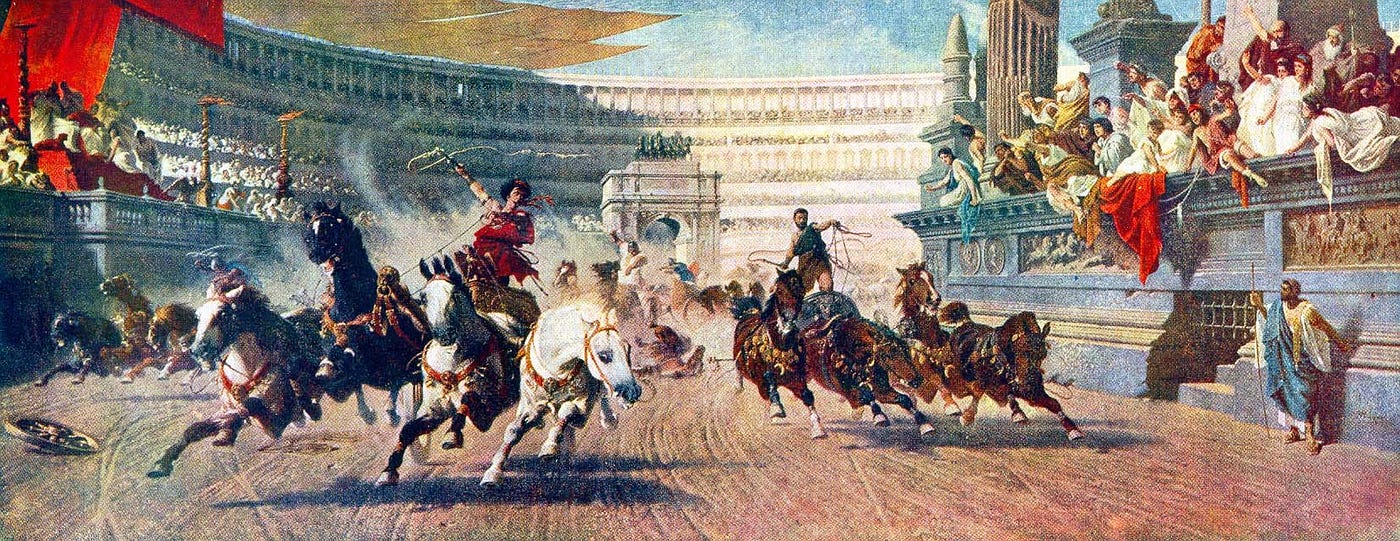Justinian vs. The Blues and Greens: The Epic Showdown of the Nika Riots
HELLO AND WELCOME TO MY BLOG!
Greetings, history aficionados! Buckle up for a wild ride through the annals of time as we unravel the chaos, drama, and a touch of humor surrounding the infamous Nika Riots. Get ready to travel back to 532 AD, where the chariots were racing, and the people were rioting like it was a toga party gone wrong.
Picture this: Constantinople, the grand capital of the Byzantine Empire. The air is charged with excitement as two rival chariot racing factions, the Blues and the Greens, gear up for a showdown that will go down in history as the Nika Riots. It's not your average Sunday afternoon at the Hippodrome; it's an epic clash of colors, horses, and, well, tempers.
Now, let's talk about the catalyst for this historical brouhaha. Emperor Justinian, the man with the plan, was facing some serious backlash for his policies. The Blues and the Greens, usually at each other's throats, decided to set aside their differences and unite against a common enemy—good old Justinian. It's like the ancient version of a buddy cop movie, but with more chariots and fewer donuts.
The riots kicked off with the fervor of a rock concert. The factions, fueled by a potent cocktail of sporting rivalry and political discontent, set the city on fire—both metaphorically and, at times, quite literally. Buildings were torched, streets were flooded with angry citizens, and the city was on the brink of mayhem. It was a riotous party, and everyone was invited, whether they liked it or not.
Now, enter our main character—Justinian. He wasn't just an emperor; he was a survivor. Despite the chaos unfolding in his city, Justinian stood firm. Legend has it that he considered fleeing the city, but his formidable wife, Theodora, gave him a royal reality check. "Purple makes a fine shroud," she said, reminding him that death was preferable to exile. Talk about a power couple!
Justinian, realizing the gravity of the situation, took a page from the playbook of ancient crisis management. He did what any sensible leader would do—he sent in the troops. The Byzantine army, led by the capable general Belisarius, quelled the riot with an iron fist, or in this case, a well-aimed pilum.
The aftermath? The Hippodrome, once a symbol of entertainment, became a grim reminder of the power of the people. Thousands were reportedly killed in the riot, and the city bore the scars of this tumultuous episode for years to come.
In the end, the Nika Riots were more than just a clash of chariots and colors. They were a reflection of the complex dynamics between the rulers and the ruled, a tale of political discontent spiraling into a full-blown riot. As we gaze back into the pages of history, let's not forget that even in the most tumultuous times, there's always room for a bit of humor, a dash of irony, and a lesson or two about the perils of pushing a passionate populace too far.
So, my dear readers, fasten your imaginary seatbelts and join me in exploring the wild ride that was the Nika Riots—a riotous chapter in history that proves even the most serious moments can have a touch of absurdity. Until next time, stay curious, stay amused, and never underestimate the power of a good riotous chariot race!
Oh, by the way, Just wanted to remind you that in addition to my history blog, I also have another blog dedicated to the amazing stories and facts from aviation. It's called aviationisamazing.blogspot.com, and it's packed with interesting facts from the past and nowadays. If you're a fan of learning about aviation in a fun and engaging way, then be sure to check it out! Who knows, you might just learn something new, or at least have a good laugh. Let me know in the comments if you're interested in hearing more!






.jpg/1280px-Aya_Sophia_(7144824757).jpg)


Comments
Post a Comment